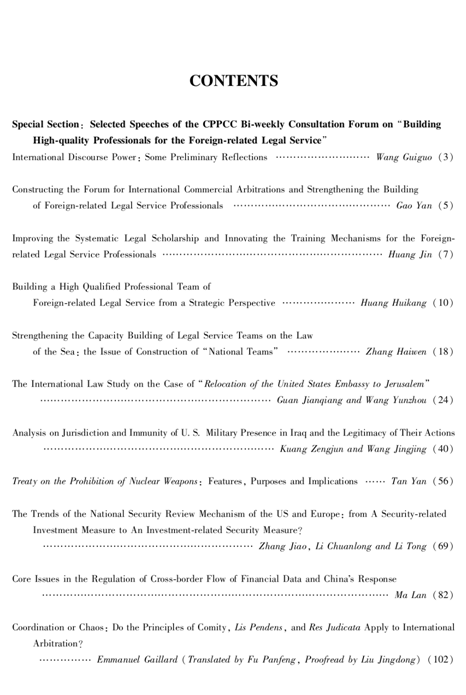
The International Law Study on the Case of “Relocation of the United States Embassy to Jerusalem”
Guan Jianqiang and Wang Yunzhou
Abstract:The United States recognizes Jerusalem as the capital of Israel and moved its embassy to Jerusalem. The State of Palestine and the United States play a legal game over the legitimacy of the action. Palestine sued the United States in the International Court of Justice.The case is highly controversial both substantively and procedurally. In terms of the standing of the International Court of Justice, Palestine has a position of standing in this case; in terms of the invalidity of the withdrawal of the United States from international treaty in this case, the Court has jurisdiction in this case. The conducts of the United States of intervention in Palestinian-Israeli relations, relocation of U.S. embassy and withdrawal from international treaty constitute a violation of the international relationship, and are also in violation of international law. The Parties shall resolve any disputes by peaceful means such as consultation and litigation.
Keywords:U.S. Embassy Relocation,Vienna Convention on Diplomatic Relations, Jurisdiction of the International Court of Justice
Analysis on Jurisdiction and Immunity of U.S. Military Presence in Iraq and the Legitimacy of Their Actions
KuangZengjun and Wang Jingjing
Abstract:The United States maintains a flexible military presence in Iraq in the form of diplomatic and security personnel, military training and exercises, assistance to counter-terrorism forces, security contractors, etc., and these different types of flexible military presence apply to different international norms and enjoy varying degrees of immunity. This paper analyzes the issue of the jurisdiction, immunity and legality of U.S. military presence action, and argues that Iraq has territorial jurisdiction over these foreign forces. The U.S. military actions have violated Iraq’s sovereignty and they cannot claim immunity. In practice, mechanisms should be developed to strengthen capacity-building in certain regard, deepen international communication and cooperation on harnessing the full potential of international law so as to increase mutual benefit
Keywords:Iraq, The United States, Flexible Military Presence, Jurisdiction, Immunity
Treaty on the Prohibition of Nuclear Weapons:Features, Purposes and Implications
Tan Yan
Abstract:The United Nations has adopted Treaty on the Prohibition of Nuclear Weapons(TPNW)in 2017.Deepening sense of responsibility and crisis on the part of non-nuclear weapon states is manifested in the treaty. And the five permanent members of the Security Council (also the nuclear powers) explicitly refused to join it. Given this sharp confrontation, non-nuclear weapon states still persist in adopting such treaty, in which prohibits using or testing the nuclear weapons explicitly for the first time; illegalizes the nuclear weapons completely; abandons the distinction between nuclear weapon states and non-nuclear weapon states and puts forward a new concept “global public good of the highest order”. Meanwhile, Non-nuclear weapon states have been able to formally enter the mainstream discourse of international nuclear law by virtue of this treaty and the debate between them and nuclear weapon states on the legality of nuclear weapon is bound to have a profound impact on the cognitions of peace, security and national interest.
Keywords:Treaty on the Prohibition of Nuclear Weapons(TPNW), Illegalization of Nuclear Weapons, Regulating of Nuclear Weapons in International Law, Nuclear Weapon States, Nonnuclear Weapon States
The Trends of the National Security Review Mechanism of the US and Europe: from A Security-related Investment Measure to An Investment-related Security Measure?
Zhang Jiao, Li Chuanlong and Li Tong
Abstract:Many countries, such as the US, UK, Germany, France, Italy, almost simultaneously upgraded their national security review mechanism (NSRM) in 2018.This raises a second round of discussion about the “international standard” of NSRM. The development of international investment stimulates the countries to upgrade the mechanism since it is an investment management measure, while the current situation of national strategic competition triggers the return of the NSRM to the political attribute of “national security”, representing the politicization of the NSRM. The NSRM is not only a security-related investment measure but also an investment-related security measure. Taking it as a part of national security strategy may help to better understand that foreign investments in the area of key infrastructure by State-owned companies from strategic competition countries would be the main focus of the NSRM of the US and Europe in the current and near future.
Keywords:Foreign Direct Investment, Freedom of Investment, National Security, National Strategy
Core Issues in the Regulation of Cross-border Flow of Financial Data and China’s Response
Ma Lan
Abstract:The regulation of cross-border flow of financial data is essentially a legal restriction imposed by the State public power to manage financial markets and economic and social life. This regulation has its national and socio-economic roots and should be maintained at reasonable limits. The scope of financial data, the controller of financial data, and the purposes and conditions of cross-border flow of financial data are the core entry points for the regulation of cross-border flow of financial data. Throughout the global legislative practice, financial data exhibits hierarchical classification characteristics, the scope of financial data controllers has expanded, and different purposes of cross-border flow of financial data correspond to different cross-border transmission conditions.China has made continuous efforts in financial data protection legislation, but there are still some problems that need to be improved To cope with current problems and focus on future development, China should adjust its regulatory thinking and improve its regulations concerning the scope of financial data, financial data controllers, and the purposes and conditions of the cross-border transfer of financial data.
Keywords:Financial Data, Cross-border Data Flow, Financial Data Controller, Purposes of Cross-border Transfer of Financial Data
Coordination or Chaos: Do the Principles of Comity, Lis Pendens, and Res Judicata Apply to International Arbitration?
Emmanuel Gaillard (Translated by Fu Panfeng, Proofread by Liu Jingdong)
Abstract:In international arbitration, coordination between state courts and arbitral tribunals, between different arbitral tribunals and between different state courts, is needed to prevent chaotic situations caused by conflicting decisions. The guiding principle in resolving jurisdictional conflicts between state courts and arbitral tribunals is the principle of competence-competence rather than international comity or lis pendens.Once an arbitral award or a court decision is rendered, the coordination between state courts and arbitral tribunals should resort to res judicata. It is not appropriate to apply hard rules for the coordination between different arbitral tribunals which could be better achieved by arbitrators using their discretionary power. Regarding the coordination between different state courts, it is only by focusing on the arbitral award itself rather than the related court decisions from other countries and deciding by its own standards that judicial coordination and international justice can be better served.
Keywords:International Arbitration, Comity, Lis Pendens, Res Judicata, Coordination



